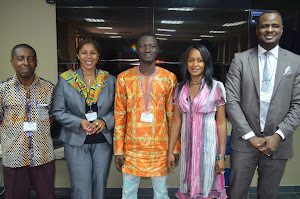FROM EDMUND SMITH-ASANTE, SOGAKOPE, VOLTA REGION
Disasters, both natural and man-made, are a common phenomenon the world
over, some of which escalate into emergencies as a result of their magnitude.
But even where strategies and plans have been thought out, the danger
that the destruction and disruption of basic water, sanitation and hygiene
facilities and services pose to an already precarious situation have most times
been ignored, thus giving rise to epidemics of immeasurable proportions.
To enable a good delivery on the work at hand, the group will also
discuss the disaster history of Ghana; geographical areas of disasters; WASH advocacy;
Assessment, Monitoring and Surveillance; Data and Information Management;
Resources Mobilisation, training and capacity building of national and regional
staff as well as NGOs; Safe Excreta Disposal and Schools WASH among a host of
others.
 |
| Stakeholders busy at work |
However, despite their unpredictability sometimes, the absence of a plan
to deal with incidents and natural occurrences such as floods, earthquakes,
civil strife and wars as well as fire outbreaks as has been experienced in
Ghana lately, always has the propensity to aggravate an already bad situation.
It is as a result of this that Ghana has, under its WASH in Emergencies
(WinE) initiative, set out to develop a National Strategy on Water, Sanitation
and Hygiene (WASH) Emergency Preparedness and Response Plan (EPRP).
Ghana’s WinE Technical Working Group has since Monday, July 15, 2013 been
holed up in Sogakope in the Volta Region in a three-day workshop to formulate
the plan.
Led by the ministries of Water Resources Works and Housing (MWRWH) and
Local Government and Rural Development (MLGRD) in collaboration with the United
Nations Children Fund (UNICEF), membership of the Technical Group comprises the
Ghana Health Service (GHS), Ghana Education Service (GES) National Disaster
Management Organisation (NADMO), Ghana Watsan Journalists Network (GWJN), the
Coalition of NGOs in Water and Sanitation (CONIWAS), WaterAid Ghana (WAG),
Water Resources Commission (WRC), the Environmental Health and Sanitation
Directorate (EHSD), Water Directorate (WD) and Community Water and Sanitation
Agency (CWSA) among others.
For the three days, the sub-committee will seek to look at standard
operation procedures during small scale and large scale operations, strategies
to be employed during emergencies, the specific objectives of the EPRP, the
WASH Technical Working Group’s coordination strategy, WASH supplies and
emergency scenarios in Ghana.
 |
| Some participants in a group discussion |
In an interview, Mr Enoch Ofosu, Water Resources Engineer (Specialist)
and Coordinator of the WinE initiative said during emergencies it is always
realised that most of the deaths that happen are due to WASH-related issues and
is very sensitive during emergencies.
Explaining that the plan is being developed solely for water, sanitation
and hygiene during emergencies, he disclosed that although NADMO has an
overarching plan for all emergencies, “it is required that each sector does a
specific emergency plan to feed into the overarching plan”
“After this plan we hope to achieve a coordinated effort when it comes to
WASH in emergencies. What civil society is doing, what the UN agencies and
other bodies are doing, what the development partners are doing, we are hoping
that they will all be properly coordinated, then we will achieve synergy.
Leadership will indeed be by government and then Government will indeed set the
agenda and everybody will follow so we can have a clear focus,” he stated.
Disagreeing that it had taken Ghana so long to come up with a plan as was
being developed, Enoch Ofosu said all that government sought to achieve was to
coordinate the efforts put in by various organisations during disasters and
emergencies.
“And it is a right time to do such things to put what is existing already
in a much unified umbrella,” he stressed, assuring that the plan will come into
force in 2013.
For his part, Mr Basilius Cahyanto, Consultant and a Water, Sanitation
and Hygiene Specialist at UNICEF facilitating the workshop expressed his
satisfaction at the commitment and involvement of the participants in the
process.
Touching on how the plan will be beneficial to Ghana once it is
completed, he said “This is a guideline and hopefully when it is completed both
the government and NGOs will have better preparedness for emergency and by this
plan they will know how best to react in emergencies.”
Alhaji Abubakari Sufyan, Principal Health Promoter, Health Promotion
Department, Ghana Health Service (GHS), opined thus: “For us to expect the
unexpected, it is very important because the unexpected will always come.
Realities on the ground tell us that whether we plan for it or not it will
always come. If we plan for it as we are trying to do now, then the effects or
the consequences can be reduced.”
Saying the GHS uses communication for preventive healthcare and promotion
of health in its work, he envisaged if such document is well produced it will
add weight to their area of operation. He therefore applauded the two ministries
for bringing various stakeholders together to ensure key elements are
incorporated into the document.
Also commenting about the workshop, development of an emergency
preparedness and response plan and its significance to NADMO, Mr. Isaac T. Akpey,
Assistant Chief Disaster Control Officer, said it was very enlightening, as
hitherto emergencies were attended to without recourse to the possibility of
people getting contaminated by the water they use or by the fact that their
sanitary systems have been destroyed.
“All what was done was to go and rescue the people, restore them back to
where they were and that is it, but the relationship between the emergency and
the WASH systems was not looked at and this is introducing it into emergencies.
But to NADMO it will be of great benefit that we will have a very broad
approach to disaster management, where every bit of it is tackled by different
people,” he indicated.





No comments:
Post a Comment